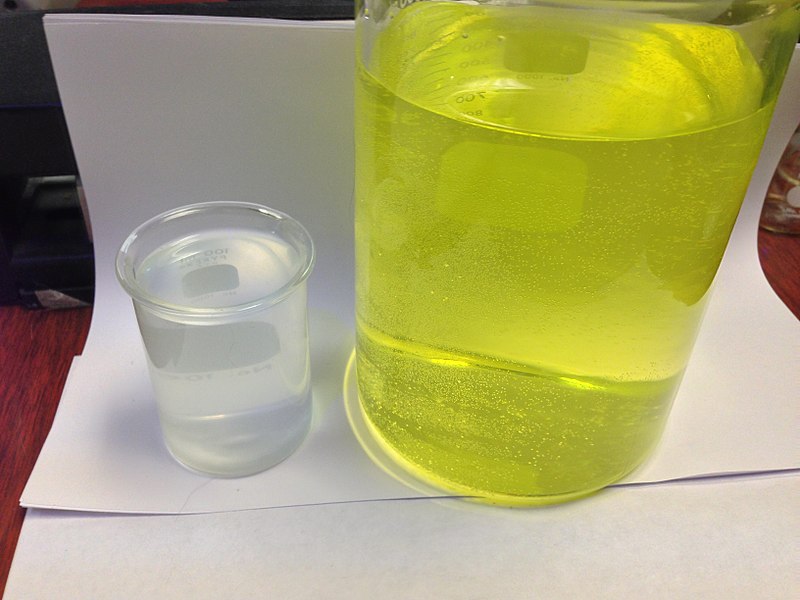Difference Between Saturated and Concentrated Solution
Key Difference – Saturated vs Concentrated Solution
A solution is a liquid phase of matter that is formed by dissolving a solute in a solvent. A solution can be converted into a saturated solution by adding more solutes until no more solutes can be dissolved. A concentrated solution contains a considerably high amount of solutes, but that amount is not the maximum. The key difference between saturated and concentrated solution is that additional solutes cannot be dissolved in a saturated solution since it contains the maximum amount of solutes whereas additional solutes can be dissolved in a concentrated solution because it does not contain the maximum amount of solutes (not saturated with the solute).
CONTENTS
1. Overview and Key Difference
2. What is Saturated Solution
3. What is Concentrated Solution
4. Similarities Between Saturated and Concentrated Solution
5. Side by Side Comparison – Saturated vs Concentrated Solution in Tabular Form
6. Summary
What is Saturated Solution?
A saturated solution is a chemical solution containing the maximum concentration of a solute dissolved in the solvent. Additional solutes cannot be dissolved in a saturated solution since it contains the maximum amount of solutes. The opposite form of the saturated solution is the unsaturated solution. The unsaturated solution is not saturated with the solute. An unsaturated solution can be either a concentrated solution or a dilute solution.
There are several factors that affect the saturation of a solution. These factors affect the dissolution of solutes in the solvent.
A saturated solution can be produced by adding a solute to the solvent until no more solutes are dissolving. Or else, it can be done by evaporating the solvent of solution until solute starts to form crystals. Another method, though not that much common is to add seeds of crystals to a supersaturated solution. A supersaturated solution contains many solutes that stay dissolved even if the solution is cooled. When seeds of crystals are added to this supersaturated solution, the solutes starts to crystallize, giving a saturated solution.

Figure 01: Sparkling Juices are Saturated Solutions
Some examples of saturated solutions include carbonated water (saturated with carbon), saturated sugar solutions (no more sugar can be dissolved), beer or sparkling juices are saturated with carbon dioxide, etc.
What is Concentrated Solution?
A concentrated solution is a chemical solution containing a high amount of a solute dissolved in the solvent. Additional solutes can be dissolved in a concentrated solution because it does not contains the maximum amount of solutes (not saturated with the solute). The opposite form of the concentrated solution is dilute solution. A dilute solution contains a relatively low amount of solutes dissolved in a solvent.

Figure 02: A concentrated solution (right) has a strong colour compared to a diluted solution (left)
The concentrated solutions of acids or bases are recognized as strong acids or strong bases. In contrast, dilute acids or bases are weak acids or bases. The term concentrated is used to give a quantitative idea about a solution. A concentrated solution can be formed by dissolving more solutes into a solution or by evaporating a solution until a considerable amount of solvent is evaporated leaving solutes in the solution. The concentration of a solution can be given as below. There the concentration is given by the unit mol/L.
Concentration = number of moles of solutes / volume of the solution
What are the Similarities Between Saturated and Concentrated Solution?
- Both Saturated and Concentrated Solution are solutions containing a high amount of solutes
- Both Saturated and Concentrated Solution terms express a quantitative idea about solutions.
What is the Difference Between Saturated and Concentrated Solution?
Saturated vs Concentrated Solution | |
| A saturated solution is a chemical solution containing the maximum concentration of a solute dissolved in the solvent. | A concentrated solution is a chemical solution containing a high amount of a solute dissolved in the solvent. |
| Amount of Solutes | |
| Saturated solution contains the maximum amount of solutes that it can hold. | Concentrated solution contains a considerably high amount of solutes. |
| Addition of More Solutes | |
| Additional solutes cannot be dissolved in a saturated solution since it contains the maximum. | Additional solutes can be dissolved in a concentrated solution because it does not contains the maximum amount of solutes (not saturated with the solute). |
| Opposite Form | |
| The opposite form of saturated solution is unsaturated solution. | The opposite form of concentrated solution is dilute solution. |
| Examples | |
| Some examples of saturated solutions include carbonated water, saturated sugar solutions, beer or sparkling juices are saturated with carbon dioxide, etc. | Some examples of concentrated solutions include concentrated acids and concentrated bases used in laboratories. |
Summary – Saturated vs Concentrated Solution
A saturated solution is a form of a concentrated solution, but it contains the maximum amount of solutes that can hold. The difference between saturated and concentrated solution is that additional solutes cannot be dissolved in a saturated solution since it contains the maximum amount of solutes whereas additional solutes can be dissolved in a concentrated solution because it does not contain the maximum amount of solutes (not saturated with the solute).
Reference:
1.“13.2: Saturated Solutions and Solubility.” Chemistry LibreTexts, Libretexts, 8 Oct. 2017. Available here
2.“How to Concentrate a Solution.” Sciencing. Available here
3.Helmenstine, Anne Marie, D. “Saturated Solution Definition and Examples.” ThoughtCo, Jun. 20, 2017. Available here
Image Courtesy:
1.’2980956′ by Nicole_80 (Public Domain) via pixabay
2.’RiboflavinSolution’By Sbharris – Own work, (CC BY-SA 3.0) via Commons Wikimedia
ncG1vNJzZmivp6x7pbXFn5yrnZ6YsqOx07CcnqZemLyue8OinZ%2Bdopq7pLGMm5ytr5Wau26%2FwK2sq5mkmrFurc2dZK%2BrXZi8r6%2FEp6urmaSasW6%2FzqWsraGfo3w%3D